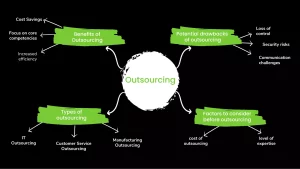Hiring Inhouse team Vs Outsourcing

“If you deprive yourself of outsourcing and your competitors do not, you are putting yourself out of business”- Lee Kuan Yew.
Businesses outsource staffing to reduce costs and focus on core functions.
But is outsourcing better than hiring an inhouse team, let us read this further in the blog.
What is outsourcing?
Hiring a third-party outside company to perform tasks or services that were traditionally performed in-house by the company’s own employees is called outsourcing. Outsourcing can be done for various reasons, such as to reduce costs, improve efficiency, or focus on core competencies.
Different types of outsourcing
There are many different types of outsourcing, but some of the most common include:
- Information technology (IT) outsourcing: This involves hiring a third-party company to manage a company’s IT infrastructure, such as its servers, networks, and software.
- Customer service outsourcing involves hiring a third-party company to handle customer service inquiries, such as answering phone calls and emails.
- Manufacturing outsourcing: This involves hiring a third-party company to manufacture a company’s products.
- Accounting outsourcing involves hiring a third-party company to take care of the company’s accounting tasks, such as bookkeeping and financial reporting.
Benefits of outsourcing
Some of the benefits that companies can get from outsourcing resources include:
- Cost savings: Outsourcing reduces costs for the company and eliminates the need to hire and train employees to perform specific tasks.
- Increased efficiency: Outsourcing can help businesses improve efficiency by tapping into the expertise and resources of third-party companies.
- Focus on core competencies: Outsourcing enables businesses to focus on their core competencies and prevent failures down in non-core tasks.
Potential drawbacks of outsourcing
Outsourcing also has some potential drawbacks, such as:
- Loss of control: When a business outsources a task, it loses some control over how that task is performed.
- Security risks: Outsourcing at times can increase the risk of data breaches.
- Communication challenges: Outsourcing can create communication challenges, primarily if the third-party company is in a different country.
Whether or not to outsource is a decision that should be made on a case-by-case basis. Businesses should carefully consider their decision to outsource the resources before making a decision.
Factors to consider before outsourcing
Here are some of the factors to consider when deciding whether or not to outsource:
- The cost of outsourcing versus the cost of doing it in-house.
- The level of expertise and experience of the third-party company.
- The quality of the services that the third-party company can provide.
- The security risks involved in outsourcing.
- The communication challenges that may arise.
- The impact on the company’s culture and morale.
Outsourcing Vs Hiring Inhouse Team
Here is the comparison of outsourcing and hiring inhouse team:
| Aspect | Outsourcing | Hiring in-house team |
| Cost | Potentially lower initial costs | Higher initial and ongoing costs |
| Expertise | Access to specialized skills | Direct control over skill selection |
| Flexibility | Scalability and flexibility | Limited flexibility in scaling |
| Management | Outsourcing company manages workers | Direct management responsibility |
| Time and Effort | Saves time in recruitment and training | Requires time for hiring and training |
| Communication | Remote collaboration may be required | Easier in-person communication |
| Overhead | Minimal infrastructure and overhead | Increased infrastructure needs |
| Focus | Core business focus is maintained | Energy diverted to HR and management |
| Quality Control | May require close vendor monitoring | Direct control over quality |
| Cultural Alignment | Can pose challenges in alignment | Easier alignment with company culture |
How to do outsourcing for small businesses?

Outsourcing can be a great way to save time and money and focus on their core competencies. Here are some tips on how to do outsourcing for small businesses:
- Identify the tasks that you can outsource. Not all jobs are created equal. Some tasks are better suited for outsourcing than others. When you’re deciding which tasks to outsource, consider the following factors:
- The cost of doing the task in-house.
- The time it takes to do the task in-house.
- Your level of expertise in the task.
- The importance of the task to your business.
- The security risks involved in outsourcing the task.
- Research potential outsourcing providers. There are many different outsourcing providers, so it’s essential to research and find one that’s a good fit for your business. When you’re researching potential providers, consider the following factors:
- Their experience in the industry.
- Their expertise in the specific tasks you need help with.
- Their reputation.
- Their pricing.
- Their communication style.
- Get everything in writing. Once you’ve chosen an outsourcing provider, getting everything in writing is essential. This includes a contract that clearly defines the terms of the relationship, such as the scope of work, the fees, and the expectations of both parties.
- Set clear expectations. Setting clear expectations with your outsourcing provider from the start is important. This includes the quality of work you expect, the turnaround times, and the communication channels you’ll use.
- Monitor the work closely. Once the outsourcing provider has started working, monitoring the work closely is important. This will help you ensure that the work is being done to your standards and that there are no surprises.
- Provide feedback regularly. It’s also important to provide feedback to your outsourcing provider regularly. This will help them improve their performance and meet your expectations.
- Be prepared to change providers if necessary. If you’re not happy with the performance of your outsourcing provider, don’t be afraid to change providers. Many other providers are out there, so you’re sure to find one that’s a better fit for your business.
Outsourcing can be an excellent way for small businesses to save money and time and focus on their core competencies. By following these tips, you can ensure that your outsourcing experience is successful.
Here are some additional tips for small businesses that are considering outsourcing:
- Start small. Don’t try to outsource too much at once. Start with one or two tasks and see how it goes.
- Be flexible. Things don’t always go according to plan when you outsource. So, you better be flexible and adjust your expectations as needed.
- Build a relationship. It’s essential to build a good relationship with your outsourcing provider. It prevents any issues that may create trouble.
What are the requirements for outsourcing and inhouse hiring?
Here are the requirements for both outsourcing and in-house hiring, presented in bullet points:
Requirements for Outsourcing:
- Clearly defined tasks or projects suitable for external collaboration.
- Adequate budget for outsourcing services.
- Research and selection of reputable outsourcing vendors.
- Precise project specifications, expectations, and deliverables.
- Effective communication channels and collaboration tools.
- Legal agreements (contracts) outlining terms, scope, confidentiality, and dispute resolution.
- Data security measures to protect sensitive information.
- Compatibility with the vendor’s working methods and tools.
- Monitoring mechanisms to ensure progress and quality.
- Cultural sensitivity for global collaboration.
- Flexibility to scale up or down based on project needs.
- Quality control processes to maintain standards.
- Transition plan for handing off responsibilities.
Requirements for In-House Hiring:
- Detailed job description and qualifications for the position.
- Budget for salary, benefits, and overhead costs.
- Recruitment channels and strategies for attracting suitable candidates.
- Straightforward interview and selection process, including assessment criteria.
- Onboarding plan for integrating new employees into the company.
- Access to necessary tools, equipment, and resources.
- Communication channels and collaboration tools for in-house teams.
- Legal compliance with labour laws and regulations.
- Performance evaluation methods and feedback mechanisms.
- Professional development and training opportunities.
- Team management and leadership skills for supervisors.
- Measures to foster a positive company culture.
- Scalability considerations for potential team expansion.
Also Read : How to Hire a Perfect Social Media Marketing Team?
Conclusion
While outsourcing offers cost savings, specialised expertise, and flexibility, in-house hiring ensures direct control, cultural alignment, and personalised growth. Each approach comes with its unique prerequisites and benefits, catering to different business objectives and capacities.
As you navigate this choice, remember that the right strategy hinges on aligning your goals, resources, and the nature of tasks at hand. For further insights or assistance, feel free to reach out to us at hello[at]noboruworld.com.
FAQ
Why do businesses outsource?
Businesses outsource to reduce costs, access specialised skills, increase efficiency, and concentrate on core competencies, ultimately enhancing competitiveness and scalability.
What tasks can be outsourced?
Tasks like customer support, IT services, content creation, accounting, and manufacturing can be outsourced, among others. Essentially, any non-core task that can be efficiently handled externally.
How do I choose the right outsourcing partner?
Research reputable providers, review their experience and client feedback, evaluate their expertise in your industry, and ensure their work culture aligns with your values.
What are the benefits of outsourcing?
Benefits include cost savings, access to specialised skills, scalability, reduced administrative burden, quicker project turnaround, and increased focus on core business functions.
What are the potential challenges of outsourcing?
Challenges include communication barriers, quality control issues, potential data security risks, cultural differences, and the need for effective vendor management.
Is outsourcing suitable for small businesses?
Outsourcing can provide small businesses access to resources and skills they might not have in-house. It allows them to compete more effectively without the overhead of building large teams.
How do I ensure data security when outsourcing?
Implement confidentiality agreements, choose vendors with solid security measures, and define clear data handling protocols in the contract.
Can I outsource only a part of a project?
Yes, you can outsource specific tasks or phases of a project, providing flexibility and allowing you to retain control over critical aspects.



